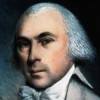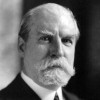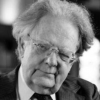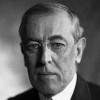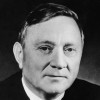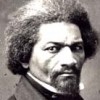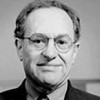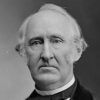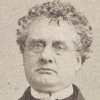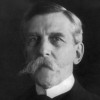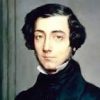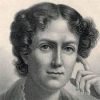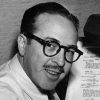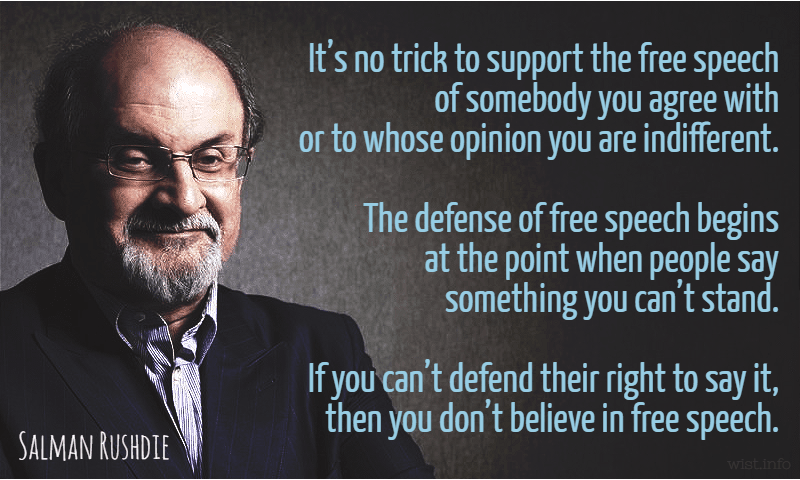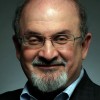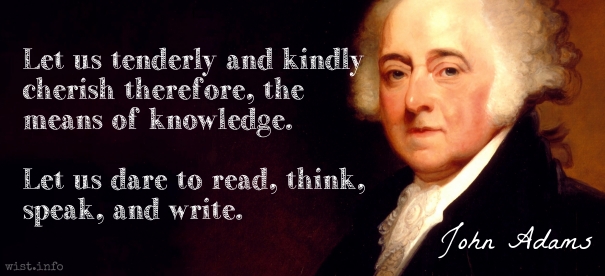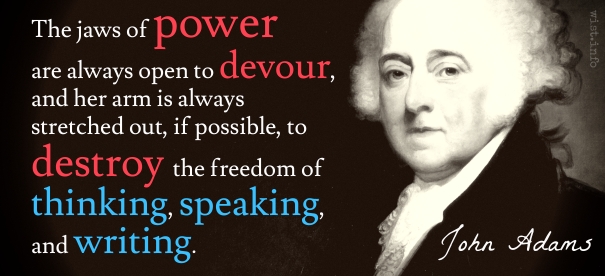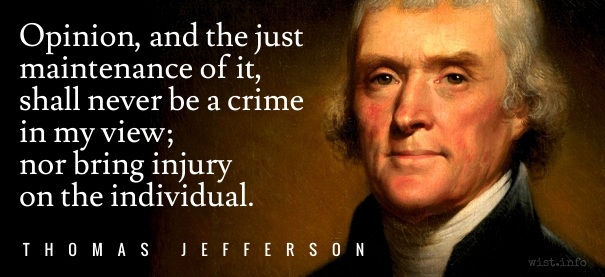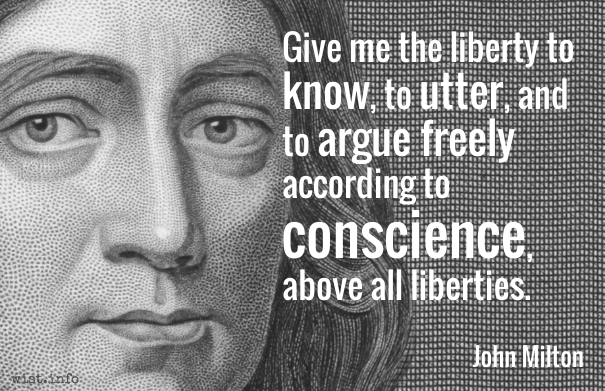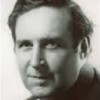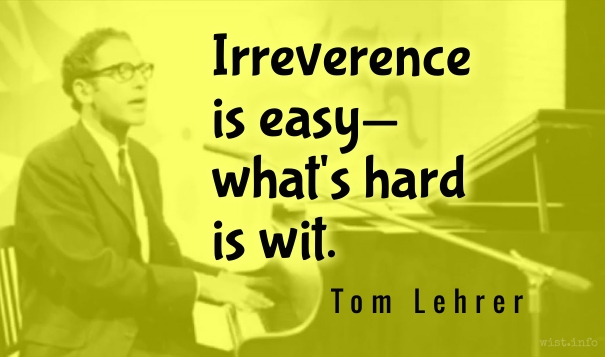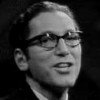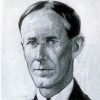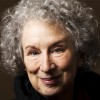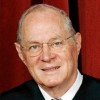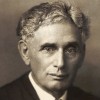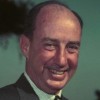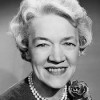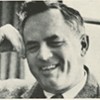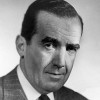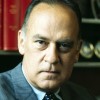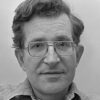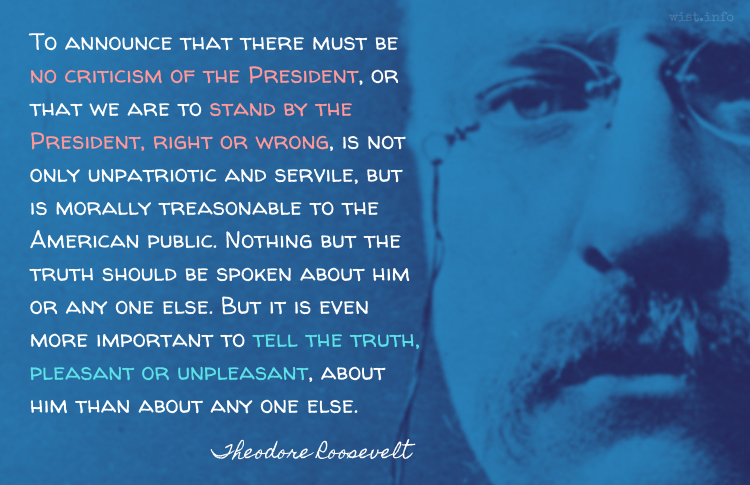In the democracies of the world, the passion for freedom of speech and of thought is always accentuated when there is an effort anywhere to keep ideas away from people and to prevent them from making their own decisions. One of the best ways of enslaving a people is to keep them from education and thus make it impossible for them to understand what is going on in the world as a whole. […] The second way of enslaving a people is to suppress the sources of information, not only by burning books, but by controlling all the other ways in which ideas are transmitted.
Eleanor Roosevelt (1884-1962) First Lady of the US (1933-45), politician, diplomat, activist
Column (1943-05-11), “My Day”
(Source)
Quotations about:
freedom of speech
Note not all quotations have been tagged, so Search may find additional quotes on this topic.
Government by the people means that the people have the right to do their own thinking and to do their own speaking about their public servants. They must speak truthfully and they must not be disloyal to the country, and it is their highest duty by truthful criticism to make and keep the public servants loyal to the country.
Theodore Roosevelt (1858-1919) American politician, statesman, conservationist, writer, US President (1901-1909)
Essay (1918-04-06), “Citizens or Subjects?” Kansas City Star
(Source)
Regarding a bill which had just passed the Senate Judiciary Committee, which would fine and imprison any one who used "contemptuous or slurring language about the President."
This passage was added to later editions of his essay, "Lincoln and Free Speech,", as printed in The Works of Theodore Roosevelt, vol. 21, The Great Adventure, ch. 7 (1925). It does not appear in the original version of the essay or book.
What is going on in the Un-American Activities Committee worries me primarily because little people have become frightened and we find ourselves living in the atmosphere of a police state, where people close doors before they state what they think or look over their shoulders apprehensively before they express an opinion.
Eleanor Roosevelt (1884-1962) First Lady of the US (1933-45), politician, diplomat, activist
Column (1947-10-29), “My Day”
(Source)
In a self-governing country the people are called citizens. Under a despotism or autocracy the people are called subjects. This is because in a free country the people are themselves sovereign, while in a despotic country the people are under a sovereign. In the United States the people are all citizens, including its President. The rest of them are fellow citizens of the President. In Germany the people are all subjects of the Kaiser. They are not his fellow citizens, they are his subjects.
This is the essential difference between the United States and Germany, but the difference would vanish if we now submitted to the foolish or traitorous persons who endeavor to make it a crime to tell the truth about the Administration when the Administration is guilty of incompetence or other shortcomings. Such an endeavor is itself a crime against the nation. Those who take such an attitude are guilty of moral treason of a kind both abject and dangerous.Theodore Roosevelt (1858-1919) American politician, statesman, conservationist, writer, US President (1901-1909)
Essay (1918-04-06), “Citizens or Subjects?” Kansas City Star
(Source)
Regarding a bill which had just passed the Senate Judiciary Committee which would fine and imprison any one who used "contemptuous or slurring language about the President."
This passage was added to later editions of his essay, "Lincoln and Free Speech,", as printed in The Works of Theodore Roosevelt, vol. 21, The Great Adventure, ch. 7 (1925). It does not appear in the original version of the essay or book.
One thing is sure — none of the arts flourishes on censorship and repression. And by this time it should be evident that the American public is capable of doing its own censoring.
Eleanor Roosevelt (1884-1962) First Lady of the US (1933-45), politician, diplomat, activist
Column (1947-10-29), “My Day”
(Source)
In the future days, which we seek to make secure, we look forward to a world founded upon four essential human freedoms.
The first is freedom of speech and expression — everywhere in the world.
The second is freedom of every person to worship God in his own way — everywhere in the world.
The third is freedom from want — which, translated into world terms, means economic understandings which will secure to every nation a healthy peacetime life for its inhabitants — everywhere in the world.
The fourth is freedom from fear — which, translated into world terms, means a world-wide reduction of armaments to such a point and in such a thorough fashion that no nation will be in a position to commit an act of physical aggression against any neighbor — anywhere in the world.
That is no vision of a distant millennium. It is a definite basis for a kind of world attainable in our own time and generation. That kind of world is the very antithesis of the so-called new order of tyranny which the dictators seek to create with the crash of a bomb.Franklin Delano Roosevelt (1882-1945) American lawyer, politician, statesman, US President (1933-1945)
Speech (1941-01-06) to Congress, Annual Message (State of the Union), “Four Freedoms,” Washington, D. C.
(Source)
FDR's first presentation of his "Four Freedoms" framework.
Not only should there be complete liberty in matters of religion and opinion, but complete liberty for each man to lead his life as he desires, provided only that in so doing he does not wrong his neighbors.
Theodore Roosevelt (1858-1919) American politician, statesman, conservationist, writer, US President (1901-1909)
Speech (1910-04-23), “Citizenship in a Republic [The Man in the Arena],” Sorbonne, Paris
(Source)
The other threat to the security of our tradition, I believe, lies at home. It is the current fear of radical ideas and of people who propound them. I do not agree with extremists of either the left or the right, but I think they should be allowed to speak and to publish, both because they themselves have, and ought to have, rights, and once their rights are gone, the rights of the rest of us are hardly safe.
Jane Jacobs (1916-2006) American-Canadian journalist, author, urban theorist, activist
“No Virtue in Meek Conformity” (1952)
(Source)
Foreword to her response to a State Department Loyalty Security Board interrogatory (1952-03-25). Reprinted in Vital Little Plans (2016).
It is by the goodness of God that in our country we have those three unspeakably precious things: freedom of speech, freedom of conscience, and the prudence never to exercise either of them.
Mark Twain (1835-1910) American writer [pseud. of Samuel Clemens]
Following the Equator, ch. 20, Epigraph (1897)
(Source)
Cited as from Pudd'nhead Wilson's New Calendar. Sometimes misquoted "... never to practice either."
To whom do you award the right to decide which speech is harmful, or who is the harmful speaker? Or to determine in advance what are the harmful consequences going to be that we know enough about in advance to prevent? To whom would you give this job? To whom are you going to award the task of being the censor? Isn’t a famous old story that the man who has to read all the pornography, in order to decide what’s fit to be passed and what is fit not to be, is the man most likely to become debauched? Did you hear any speaker in the opposition to this motion, eloquent as one of them was, to whom you would delegate the task of deciding for you what you could read? To whom you would give the job of deciding for you — relieve you of the responsibility of hearing what you might have to hear? Do you know anyone? Hands up. Do you know anyone to whom you’d give this job? Does anyone have a nominee?
The civil rights of none shall be abridged on account of religious belief or worship, nor shall any national religion be established, nor shall the full and equal rights of conscience be in any manner, or on any pretext, infringed.
The people shall not be deprived or abridged of their right to speak, to write, or to publish their sentiments; and the freedom of the press, as one of the great bulwarks of liberty, shall be inviolable.
The people shall not be restrained from peaceably assembling and consulting for their common good; nor from applying to the Legislature by petitions, or remonstrances, for redress of their grievances.
James Madison (1751-1836) American statesman, political theorist, US President (1809-17)
Speech Introducing Proposed Constitutional Amendments (1789-06-08)
(Source)
Speech before the House of Representatives, proposing a Bill of Rights amending the US Constitution. This was the first draft of the text that would go on to become the First Amendment.
I find it difficult to see how talk about sex can be placed under the kind of censorship the Court here approves without subjecting our society to more dangers than we can anticipate at the moment. It was to avoid exactly such dangers that the First Amendment was written and adopted. For myself I would follow the course which I believe is required by the First Amendment, that is, recognize that sex at least as much as any other aspect of life is so much a part of our society that its discussion should not be made a crime.
Hugo Black (1886-1971) American politician and jurist, US Supreme Court Justice (1937-71)
Ginzburg v. United States, 383 U.S. 463, 482 (1966) [dissent]
(Source)
The First Amendment is truly the heart of the Bill of Rights. The Framers balanced its freedoms of religion, speech, press, assembly and petition against the needs of a powerful central government, and decided that in those freedoms lies this nation’s only true security. They were not afraid for men to be free. We should not be.
Hugo Black (1886-1971) American politician and jurist, US Supreme Court Justice (1937-71)
James Madison Lecture, NYU School of Law (1960-02-17)
(Source)
The inaugural Madison lecture. Reprinted as "The Bill of Rights," NYU Law Review, Vol. 35 (1960-04).
Since the earliest days, philosophers have dreamed of a country where the mind and spirit of man would be free; where there would be no limits to inquiry; where men would be free to explore the unknown and to challenge the most deeply rooted beliefs and principles. Our First Amendment was a bold effort to adopt this principle — to establish a country with no legal restrictions of any kind upon the subjects people could investigate, discuss, and deny.
Hugo Black (1886-1971) American politician and jurist, US Supreme Court Justice (1937-71)
James Madison Lecture, NYU School of Law (1960-02-17)
(Source)
The inaugural Madison lecture. Reprinted as "The Bill of Rights," NYU Law Review, Vol. 35 (Apr 1960)
History should teach us then, that in times of high emotional excitement minority parties and groups which advocate extremely unpopular social or governmental innovations will always be typed as criminal gangs and attempts will always be made to drive them out. It was knowledge of this fact, and of its great dangers, that caused the Founders of our land to enact the First Amendment as a guarantee that neither Congress nor the people would do anything to hinder or destroy the capacity of individuals and groups to seek converts and votes for any cause, however radical or unpalatable their principles might seem under the accepted notions of the time.
Hugo Black (1886-1971) American politician and jurist, US Supreme Court Justice (1937-71)
Barenblatt v. United States, 360 U.S. 109, 151 (1959) [dissent]
(Source)
Our Constitution assumes that the common sense of the people and their attachment to our country will enable them, after free discussion, to withstand ideas that are wrong. To say that our patriotism must be protected against false ideas by means other than these is, I think, to make a baseless charge. Unless we can rely on these qualities—if, in short, we begin to punish speech — we cannot honestly proclaim ourselves to be a free Nation and we have lost what the Founders of this land risked their lives and their sacred honor to defend.
Hugo Black (1886-1971) American politician and jurist, US Supreme Court Justice (1937-71)
Barenblatt v. United States, 360 U.S. 109, 146 (1959) [dissent]
(Source)
These rights may be abused by using speech or press or assembly in order to incite to violence and crime. The people, through their legislatures may protect themselves against that abuse. But the legislative intervention, can find constitutional justification only by dealing with the abuse. The rights themselves must not be curtailed.The greater the importance of safeguarding the community from incitements to the overthrow of our institutions by force and violence, the more imperative is the need to preserve inviolate the constitutional rights of free speech, free press and free assembly in order to maintain the opportunity for free political discussion, to the end that government may be responsive to the will of the people and that changes, if desired, may be obtained by peaceful means. Therein lies the security of the Republic, the very foundation of constitutional government.
Charles Evans Hughes, Sr. (1862-1948) American statesman, politician, Supreme Court Justice (1910-1916, 1930-1941)
De Jonge v. Oregon, 299 U.S. 353, 364-365 (1937) [majority]
(Source)
The First Amendment means to me, however, that the only constitutional way our Government can preserve itself is to leave its people the fullest possible freedom to praise, criticize or discuss, as they see fit, all governmental policies and to suggest, if they desire, that even its most fundamental postulates are bad and should be changed.
Hugo Black (1886-1971) American politician and jurist, US Supreme Court Justice (1937-71)
Barenblatt v. United States, 360 U.S. 109, 145-46 (1959) [dissent]
(Source)
The very reason for the First Amendment is to make the people of this country free to think, speak, write and worship as they wish, not as the Government commands.
Hugo Black (1886-1971) American politician and jurist, US Supreme Court Justice (1937-71)
Machinists v. Street, 367 U.S. 740, 788 (1961) [dissenting]
(Source)
The case is frequently called "IAM v. Street" (International Association of Machinists).
A nation which, in the name of loyalty or of patriotism or of a sincere and high-sounding idea, discourages criticism and dissent, and puts a premium on acquiescence and conformity, is headed for disaster.
No man shall be compelled to frequent or support any religious worship, place, or ministry whatsoever, nor shall be enforced, restrained, molested, or burthened in his body or goods, nor shall otherwise suffer, on account of his religious opinions or belief; but that all men shall be free to profess, and by argument to maintain, their opinions in matters of religion, and that the same shall in no wise diminish, enlarge, or affect their civil capacities.
Thomas Jefferson (1743-1826) American political philosopher, polymath, statesman, US President (1801-09)
Document (1776-06-18), “Virginia Statute for Religious Freedom,” Preamble (enacted 1786-01-16)
(Source)
We cannot have a society half slave and half free; nor can we have thought half slave and half free. If we create an atmosphere in which men fear to think independently, inquire fearlessly, express themselves freely, we will in the end create the kind of society in which men no longer care to think independently or to inquire fearlessly.
There can be no free speech in a mob: free speech is one thing a mob can’t stand.
Northrop Frye (1912-1991) Canadian literary critic and literary theorist
The Educated Imagination, Talk 6 “The Vocation of Eloquence” (1963)
(Source)
The nature of liberal democracy prevents propagandistic statements from being banned, since among the liberties it permits is the freedom of speech. But since humans have characteristic rational weaknesses and are susceptible to flattery and manipulation, allowing propaganda has a high likelihood of leading to tyranny, and hence to the end of liberal democracy.
Jason Stanley (b. 1969) American philosopher, epistemologist, academic
How Propaganda Works, ch. 1 (2015)
(Source)
I have always been among those who believed that the greatest freedom of speech was the greatest safety, because if a man is a fool, the best thing to do is to encourage him to advertise the fact by speaking. It cannot be so easily discovered if you allow him to remain silent and look wise, but if you let him speak, the secret is out, and the world knows that he is a fool. So it is by the exposure of folly that it is defeated, not by the seclusion of folly, and, in this free air of free speech, men get into that sort of communication with one another which constitutes the basis of all common achievement.
Woodrow Wilson (1856-1924) US President (1913-20), educator, political scientist
Speech, Institute of France, Paris (10 May 1919)
(Source)
Any test that turns on what is offensive to the community’s standards is too loose, too capricious, too destructive of freedom of expression to be squared with the First Amendment. Under that test, juries can censor, suppress, and punish what they don’t like, provided the matter relates to “sexual impurity” or has a tendency “to excite lustful thoughts”. This is community censorship in one of its worst forms. It creates a regime where in the battle between the literati and the Philistines, the Philistines are certain to win.
William O. Douglas (1898-1980) US Supreme Court justice (1939-75)
Roth v. United States, 354 U.S. 476, 512, dissenting opinion (1957)
(Source)
Equally clear is the right to hear. To suppress free speech is a double wrong. It violates the rights of the hearer as well as those of the speaker. It is just as criminal to rob a man of his right to speak and hear as it would be to rob him of his money.
Frederick Douglass (1817-1895) American abolitionist, orator, writer
“A Plea for Freedom of Speech in Boston” (9 Dec 1880)
(Source)
Censorship laws are blunt instruments, not sharp scalpels. Once enacted, they are easily misapplied to merely unpopular or only marginally dangerous speech.
Alan M. Dershowitz (b. 1938) American lawyer, jurist, political commentator
Finding, Framing, and Hanging Jefferson, ch. 15 (2008)
(Source)
As President of our country and Commander-in-Chief of our military, I accept that people are going to call me awful things every day, and I will always defend their right to do so.
Barack Obama (b. 1961) American politician, US President (2009-2017)
Speech, United Nations (25 Sep 2012)
(Source)
Let us believe that the whole of truth can never do harm to the whole of virtue. Trust it. And remember, that, in order to get the whole of truth, you must allow every man, right or wrong, freely to utter his conscience, and protect him in so doing.
Wendell Phillips (1811-1884) American abolitionist, orator, social activist
“The Boston Mob,” speech, Antislavery Meeting, Boston (21 Oct 1855)
(Source)
"On the Twentieth Anniversary of the Mob of October 21, 1835."
The time to assert rights is when they are denied; the men to assert them are those to whom they are denied. The community which dares not protect its humblest and most hated member in the free utterance of his opinions, no matter how false or hateful, is only a gang of slaves.
Wendell Phillips (1811-1884) American abolitionist, orator, social activist
“Mobs and Education,” Speech, Twenty-Eighth Congregational Society, Boston (16 Dec 1860)
(Source)
As reported in the Liberator (21 Dec 1860).
Note: There is a synthetic quotation frequently attributed to Phillips that is a actually combination of this one, and these three others:No matter whose lips that would speak, they must be free and ungagged. The community which dares not protect its humblest and most hated member in the free utterance of his opinions, no matter how false or hateful, is only a gang of slaves. If there is anything in the universe that can’t stand discussion, let it crack.
While Phillips often reused rhetorical elements (as most orators do), this particular combination appears to be combination not actually found in his speeches or writing.
“The right to think, to know and to utter,” as John Milton said, is the dearest of all liberties. Without this right, there can be no liberty to any people; with it, there can be no slavery.
John A. Andrew (1818-1867) American lawyer, politician, abolitionist
Letter (1860)
(Source)
Letter written after his election as Massachusetts governor. referencing Milton's Areopagitica. Quoted by Wendell Phillips in his "Mobs and Education" speech (16 Dec 1860), and often attributed to Phillips.
Men are educated and the State uplifted by allowing all — every one — to broach all their mistakes and advocate all their errors. The community that will not protect its most ignorant and unpopular member in the free utterance of his opinions, no matter how false or hateful, is only a gang of slaves.
Wendell Phillips (1811-1884) American abolitionist, orator, social activist
“The Scholar in a Republic,” Speech, Centennial Anniversary of the Phi Beta Kapa of Harvard College (30 Jun 1881)
(Source)
Persecution for the expression of opinions seems to me perfectly logical. If you have no doubt of your premises or your power, and want a certain result with all your heart, you naturally express your wishes in law, and sweep away all opposition. To allow opposition by speech seems to indicate that you think the speech impotent, as when a man says that he has squared the circle, or that you do not care wholeheartedly for the result, or that you doubt either your power or your premises.
But when men have realized that time has upset many fighting faiths, they may come to believe even more than they believe the very foundations of their own conduct that the ultimate good desired is better reached by free trade in ideas — that the best test of truth is the power of the thought to get itself accepted in the competition of the market, and that truth is the only ground upon which their wishes safely can be carried out.
That, at any rate, is the theory of our Constitution. It is an experiment, as all life is an experiment. Every year, if not every day, we have to wager our salvation upon some prophecy based upon imperfect knowledge. While that experiment is part of our system, I think that we should be eternally vigilant against attempts to check the expression of opinions that we loathe and believe to be fraught with death, unless they so imminently threaten immediate interference with the lawful and pressing purposes of the law that an immediate check is required to save the country.
Oliver Wendell Holmes, Jr. (1841-1935) American jurist, Supreme Court Justice
Abrams v. United States, 250 U.S. 616 (1919) [dissent]
(Source)
America is therefore a free country, in which, lest anyone be hurt by your remarks, you are not allowed to speak freely of private individuals or of the State; of the citizen or of the authorities; of public or of private undertakings; or, in short, of anything at all, except it be of the climate and the soil; and even then Americans will be found ready to defend either the one or the other, as if they had been contrived by the inhabitants of the country.
Alexis de Tocqueville (1805-1859) French writer, diplomat, politician
Democracy in America, Vol. 1, “Public Spirit in the United States” (1835) [tr. Reeve (1839)]
(Source)
An opinion, right or wrong, can never constitute a moral offense, nor be in itself a moral obligation. It may be mistaken; it may involve an absurdity, or a contradiction. It is a truth; or it is an error: it can never be a crime or a virtue.
Democracy means that people can say what they want to. All the people. It means that they can vote as they wish. All the people. It means that they can worship God in any way they feel right, and that includes Christians and Jews and voodoo doctors as well.
Dalton Trumbo (1905-1976) American screenwriter and novelist [James Dalton Trumbo]
The Remarkable Andrew (1942)
Based on Trumbo's 1941 book of the same name. Parallel text.
It’s no trick to support the free speech of somebody you agree with or to whose opinion you are indifferent. The defense of free speech begins at the point when people say something you can’t stand. If you can’t defend their right to say it, then you don’t believe in free speech.
Salman Rushdie (b. 1947) Indian novelist
“Do we have to fight the battle for the Enlightenment all over again?” The Independent (22 Jan 2005)
(Source)
Our loyalty is due entirely to the United States. It is due to the President only and exactly to the degree in which he efficiently serves the United States. It is our duty to support him when he serves the United States well. It is our duty to oppose him when he serves it badly.
Theodore Roosevelt (1858-1919) American politician, statesman, conservationist, writer, US President (1901-1909)
Essay (1918-04-06), “Citizens or Subjects?” Kansas City Star
(Source)
Regarding a bill which had just passed the Senate Judiciary Committee which would fine and imprison any one who used "contemptuous or slurring language about the President."
This passage was added to later editions of his essay, "Lincoln and Free Speech,", as printed in The Works of Theodore Roosevelt, vol. 21, The Great Adventure, ch. 7 (1925). It does not appear in the original version of the essay or book. See Roosevelt and Roosevelt.
Let us tenderly and kindly cherish, therefore, the means of knowledge. Let us dare to read, think, speak and write.
John Adams (1735-1826) American lawyer, Founding Father, statesman, US President (1797-1801)
Essay (1765-10-21), “A Dissertation on the Canon and the Feudal Law,” No. 4, Boston Gazette
(Source)
The jaws of power are always open to devour, and her arm is always stretched out, if possible, to destroy the freedom of thinking, speaking, and writing.
John Adams (1735-1826) American lawyer, Founding Father, statesman, US President (1797-1801)
Essay (1765-09-30), “A Dissertation on the Canon and the Feudal Law,” No. 3, Boston Gazette
(Source)
Originally written for the Sodalitas Club.
I disapprove of what you say, but I will defend to the death your right to say it.
Voltaire (1694-1778) French writer [pseud. of Francois-Marie Arouet]
(Misattributed)
(Source)
The words are not found in any Voltaire and actually belong to historian Evelyn Beatrice Hall, writing as S. G. Tallentyre in The Friends of Voltaire (1906), describing an 1759 incident where Voltaire learned that Claude-Adrien Helvétius' book On the Mind [De l’esprit] had been burned (along with Voltaire's own "On Natural Law") after condemnation by the Paris Parliament and the Sorbonne.‘What a fuss about an omelette!’ he had exclaimed when he heard of the burning. How abominably unjust to persecute a man for such an airy trifle as that! ‘I disapprove of what you say, but I will defend to the death your right to say it,’ was his attitude now.Hall later wrote to a friend that the actual words were her own and ought not to have had quotation marks.
Variations:More information here.
- I wholly disapprove of what you say -- and will defend to the death your right to say it.
- Monsieur l’Abbé, je déteste ce que vous écrivez, mais je donnerais ma vie pour que vous puissiez continuer à écrire.
But opinion, & the just maintenance of it shall never be a crime in my view; nor bring injury on the individual
Thomas Jefferson (1743-1826) American political philosopher, polymath, statesman, US President (1801-09)
Letter (1801-03-29) to Samuel Adams
(Source)
Sometimes misattributed to George Washington.
Give me the liberty to know, to utter, and to argue freely according to conscience, above all liberties.
John Milton (1608-1674) English poet
Areopagitica: a Speech for the Liberty of Unlicensed Printing (1644)
(Source)
Thus, if the First Amendment guarantee of freedom of speech and press is to mean anything in this field, it must allow protests even against the moral code that the standard of the day sets for the community. In other words, literature should not be suppressed merely because it offends the moral code of the censor.
William O. Douglas (1898-1980) US Supreme Court justice (1939-75)
Roth v. United States, 354 U.S. 476, 513, dissenting opinion (1957)
(Source)
Alas, irreverence has been subsumed by mere grossness, at least in the so-called mass media. What we have now — to quote myself at my most pretentious — is a nimiety of scurrility with a concomitant exiguity of taste. For example, the freedom (hooray!) to say almost anything you want on television about society’s problems has been co-opted (alas!) by the freedom to talk instead about flatulence, orgasms, genitalia, masturbation, etc., etc., and to replace real comment with pop-culture references and so-called “adult” language. Irreverence is easy — what’s hard is wit.
Whatever may be the immediate gains and losses, the dangers to our safety arising from political suppression are always greater than the dangers to that safety arising from political freedom. Suppression is always foolish. Freedom is always wise. That is the faith, the experimental faith, by which we Americans have undertaken to live. If we, the citizens of today, cannot shake ourselves free from the hysteria which blinds us to that faith, there is little hope for peace and security, either at home or abroad.
They taught me that the truth would make me free but failed to warn me of the kind of trouble I’d get into by trying to tell it — I remain duly grateful.
Margaret Atwood (b. 1939) Canadian writer, literary critic, environmental activist
“Attitude,” Commencement Address, University Of Toronto (14 Jun 1983)
(Source)
The remedy for speech that is false is speech that is true. This is the ordinary course in a free society. The response to the unreasoned is the rational; to the uninformed, the enlightened; to the straight-out lie, the simple truth.
.
I loved coming to the US in 1992, mostly because I loved the idea that freedom of speech was paramount. I still do. With all its faults, the US has Freedom of Speech. The First Amendment states that you can’t be arrested for saying things the government doesn’t like. You can say what you like, write what you like, and know that the remedy to someone saying or writing or showing something that offends you is not to read it, or to speak out against it. I loved that I could read and make my own mind up about something.
Neil Gaiman (b. 1960) British author, screenwriter, fabulist
Blog entry (2008-12-01), “Why defend freedom of icky speech?”
(Source)
The Law is a blunt instrument. It’s not a scalpel. It’s a club. If there is something you consider indefensible, and there is something you consider defensible, and the same laws can take them both out, you are going to find yourself defending the indefensible.
Neil Gaiman (b. 1960) British author, screenwriter, fabulist
Blog entry (2008-12-01), “Why defend freedom of icky speech?”
(Source)
See Dershowitz.
No man ought to be hindered saying or writing what he pleases on the conduct of those who undertake the management of national affairs, in which all are concerned, and therefore have the right to inquire, and to publish their suspicions concerning them. For if you punish the slanderer, you deter the fair inquirer.
James Burgh (1714-1775) British politician and writer
Political Disquisitions, Book 1 “Of Government, briefly” (1774)
(Source)
Liberty is meaningless where the right to utter one’s thoughts and opinions has ceased to exist. That, of all rights, is the dread of tyrants. It is the right which they first of all strike down. They know its power. Thrones, dominions, principalities, and powers, founded in injustice and wrong, are sure to tremble, if men are allowed to reason of righteousness, temperance, and of a judgment to come in their presence.
Frederick Douglass (1817-1895) American abolitionist, orator, writer
“A Plea for Freedom of Speech in Boston,” speech (9 Dec 1860)
(Source)
Everyone is in favor of free speech. Hardly a day passes without its being extolled, but some people’s idea of it is that they are free to say what they like, but if anyone says anything back, that is an outrage.
Winston Churchill (1874-1965) British statesman and author
Debate, House of Commons (13 Oct 1943)
(Source)
More discussion of this quotation: If Anyone Says Anything Back, That Is an Outrage – Quote Investigator.
To preserve the freedom of the human mind, then, and freedom of the press, every spirit should be ready to devote itself to martyrdom; for as long as we may think as we will, and speak as we think, the condition of man will proceed in improvement.
Thomas Jefferson (1743-1826) American political philosopher, polymath, statesman, US President (1801-09)
Letter (1799-06-18) to William Green Mumford
(Source)
To learn who rules over you, simply find out who you are not allowed to criticize.
Voltaire (1694-1778) French writer [pseud. of Francois-Marie Arouet]
(Misattributed)
Frequently attributed to Voltaire in memes, but unsourced in any of his writings. More accurately attributed to Kevin Alfred Strom during a 1993 anti-semitic screed on a radio broadcast:To determine the true rulers of any society, all you must do is ask yourself this question: Who is it that I am not permitted to criticize?
More discussion of the attribution here, here and here.
We believe very strongly on preserving the right to differ in this country, and the right to dissent; and if I have done a good job of anything since I’ve been president, it’s to ensure that there are plenty of dissenters.
Lyndon B. Johnson (1908-1973) American politician, educator, US President (1963-69)
Press Conference (1967-11-17)
(Source)
Video:
Another and more special provision has been made by one of the amendments to the Constitution, which expressly declares, that “Congress shall make no law respecting an establishment of religion, or prohibiting the free exercise thereof, or abridging the freedom of speech, or of the press,” thereby guarding, in the same sentence, and under the same words, the freedom of religion, of speech, and of the press, insomuch that whatever violated either throws down the sanctuary which covers the others, — and that libels, falsehood, and defamation, equally with heresy and false religion, are withheld from the cognizance of federal tribunals.
Thomas Jefferson (1743-1826) American political philosopher, polymath, statesman, US President (1801-09)
Document (1798), “Kentucky Resolutions,” Resolution 3
(Source)
In protest of the Alien and Sedition Acts.
Certainly the First Amendment’s language leaves no room for inference that abridgments of speech and press can be made just because they are slight. That Amendment provides, in simple words, that “Congress shall make no law … abridging the freedom of speech, or of the press.” I read “no law … abridging” to mean no law abridging.
Hugo Black (1886-1971) American politician and jurist, US Supreme Court Justice (1937-71)
Smith v. California, 361 U.S. 147, 157 (1959) [concurring]
(Source)
I prefer a man who will burn the flag and then wrap himself in the Constitution to a man who will burn the Constitution and then wrap himself in the flag.
Molly Ivins (1944-2007) American writer, political columnist [Mary Tyler Ivins]
(Misattributed)
(Source)
While this appeared in her regular syndicated column (1997-06-29), Ivins was actually quoting a comment previously made by Texas state representative Craig Washington on the floor of the Texas Senate. It is frequently misattributed to Ivins herself.
Variant: "I prefer someone who burns the flag and then wraps themselves up in the Constitution over someone who burns the Constitution and then wraps themselves up in the flag."
Those who won our independence by revolution were not cowards. They did not fear political change. They did not exalt order at the cost of liberty. To courageous, self-reliant men, with confidence in the power of free and fearless reasoning applied through the processes of popular government, no danger flowing from speech can be deemed clear and present, unless the incidence of the evil apprehended is so imminent that it may befall before there is opportunity for full discussion. If there be time to expose through discussion the falsehood and fallacies, to avert the evil by the processes of education, the remedy to be applied is more speech, not enforced silence.
Louis Brandeis (1856-1941) American lawyer, activist, Supreme Court Justice (1916-39)
Whitney v California, 274 US 357, 377 (1927) (concurring)
(Source)
If there is any principle of the Constitution that more imperatively calls for attachment than any other, it is the principle of free thought — not free thought for those who agree with us but freedom for the thought that we hate.
Oliver Wendell Holmes, Jr. (1841-1935) American jurist, Supreme Court Justice
United States v. Schwimmer, 279 U.S. 644 (1929) [Dissent]
(Source)
The show in general we feel like is a privilege. Even the idea that we can sit in the back of the country and make wise cracks … which is really what we do. We sit in the back and throw spitballs — but never forgetting that it is a luxury in this country that allows us to do that. That is, a country that allows for open satire, and I know that sounds basic and it sounds like it goes without saying. But that’s really what this whole situation is about. It’s the difference between closed and open. The difference between free and … burdened. And we don’t take that for granted here, by any stretch of the imagination.
Jon Stewart (b. 1962) American satirist, comedian, and television host. [b. Jonathan Stuart Leibowitz]
The Daily Show (2001-09-20)
(Source)
The sound of tireless voices is the price we pay for the right to hear the music of our own opinions. But there is also, it seems to me, a moment at which democracy must prove its capacity to act. Every man has a right to be heard; but no man has the right to strangle democracy with a single set of vocal chords.
Adlai Stevenson (1900-1965) American diplomat, statesman
Speech (1952-08-28), “Faith in Liberalism,” State Committee of the Liberal Party, New York City
(Source)
You ask, What makes it worth defending? and the only answer I can give is this: Freedom to write, freedom to read, freedom to own material that you believe is worth defending means you’re going to have to stand up for stuff you don’t believe is worth defending, even stuff you find actively distasteful, because laws are big blunt instruments that do not differentiate between what you like and what you don’t, because prosecutors are humans and bear grudges and fight for re-election, because one person’s obscenity is another person’s art. Because if you don’t stand up for the stuff you don’t like, when they come for the stuff you do like, you’ve already lost.
Neil Gaiman (b. 1960) British author, screenwriter, fabulist
Blog entry (2008-12-01), “Why defend freedom of icky speech?”
(Source)
Standing in the presence of the Unknown, all have the same right to think, and all are equally interested in the great question of origin and destiny. All I claim, all I plead for, is liberty of thought and expression. That is all.
I have been one of those who have carried the fight for complete freedom of information in the United Nations. And while accepting the fact that some of our press, our radio commentators, our prominent citizens and our movies may at times be blamed legitimately for things they have said and done, still I feel that the fundamental right of freedom of thought and expression is essential. If you curtail what the other fellow says and does, you curtail what you yourself may say and do.
Eleanor Roosevelt (1884-1962) First Lady of the US (1933-45), politician, diplomat, activist
Column (1947-10-29), “My Day”
(Source)
On the House Un-American Activities Committee.
It is not only in war, however, that we fight for freedom. One fights for freedom in personal contacts and in many phases of civilian life. When the war is over, the four freedoms will not have been won, we shall simply have dominated their more aggressive enemies. At all times, day by day, we have to continue fighting for freedom of religion, freedom of speech, freedom from fear, and freedom from want — for these are things that must be gained in peace as well as in war. At all times, day by day, we have to continue fighting for freedom of religion, freedom of speech, and freedom from want — for these are things that must be gained in peace as well as in war.
Eleanor Roosevelt (1884-1962) First Lady of the US (1933-45), politician, diplomat, activist
Column (1943-04-15), “My Day”
(Source)
The first principle of a free society is an untrammeled flow of words in an open forum.
Adlai Stevenson (1900-1965) American diplomat, statesman
Speech (1961-01-18), US Senate Committee on Foreign Relations, Washington, DC
(Source)
Statement given by Stevenson after his nomination by President-elect Kennedy to be ambassador to the United Nation, which office he held until his death in 1965. The speech (or this passage) is often cited to the New York Times coverage of it the following day, though often mistakenly dating it in 1962.
In context, he is addressing criticisms of the UN as a "debating society," noting that the US Congress often serves as such, from which he extends this principle.
How has the church in every age, when in authority, defended itself? Always by a statute against blasphemy, against argument, against free speech. And there never was such a statute that did not stain the book that it was in and that did not certify to the savagery of the men who passed it.
Robert Green Ingersoll (1833-1899) American lawyer, freethinker, orator
Trial of C.B. Reynolds for blasphemy (May 1887)
(Source)
Those of us who shout the loudest about Americanism in making character assassinations are all too frequently those who, by our own words and acts, ignore some of the basic principles of Americanism:
The right to criticize.
The right to hold unpopular beliefs.
The right to protest.
The right of independent thought.The exercise of these rights should not cost one single American citizen his reputation or his right to a livelihood, nor should he be in danger of losing his reputation or livelihood merely because he happens to know someone who holds unpopular beliefs. Who of us doesn’t? Otherwise none of us could call our souls our own. Otherwise thought control would have set in.
Margaret Chase Smith (1897-1965) American politician (US Senator, Maine)
“Declaration of Conscience” (1950-06-01)
(Source)
Speech given in the US Senate.
The most stringent protection of free speech would not protect a man in falsely shouting fire in a theatre and causing a panic.
Oliver Wendell Holmes, Jr. (1841-1935) American jurist, Supreme Court Justice
Schenck v. United States (3 Mar 1919)
(Source)
The last lesson a man ever learns is, that liberty of thought and speech is the right for all mankind; that the man who denies every article of our creed is to be allowed to preach just as often and just as loud as we ourselves. We have learned this, — been taught it by persecution on the question of slavery. No matter whose lips that would speak, they must be free and ungagged. Let us always remember that he does not really believe his own opinions, who dares not give free scope to his opponent. Persecution is really want of faith in our creed.
Wendell Phillips (1811-1884) American abolitionist, orator, social activist
“The Boston Mob,” speech, Antislavery Meeting, Boston (21 Oct 1855)
(Source)
"On the Twentieth Anniversary of the Mob of October 21, 1835."
I would give the broad sweep of the First Amendment full support. I have the same confidence in the ability of our people to reject noxious literature as I have in their capacity to sort out the true from the false in theology, economics, or any other field.
William O. Douglas (1898-1980) US Supreme Court justice (1939-75)
Roth v. United States, 354 U.S. 476, 514, dissenting opinion (1957)
(Source)
The idea that any kind of free society can be constructed in which people will never be offended or insulted is absurd. So too is the notion that people should have the right to call on the law to defend them against being offended or insulted. A fundamental decision needs to be made: do we want to live in a free society or not? Democracy is not a tea party where people sit around making polite conversation. In democracies people get extremely upset with each other. They argue vehemently against each other’s positions. (But they don’t shoot.)
Salman Rushdie (b. 1947) Indian novelist
“Do we have to fight the battle for the Enlightenment all over again?” The Independent (22 Jan 2005)
(Source)
When men have realized that time has upset many fighting faiths, they may come to believe even more than they believe the very foundations of their own conduct that the ultimate good desired is better reached by free trade in ideas — that the best test of truth is the power of the thought to get itself accepted in the competition of the market.
Freedom to discuss public affairs and public officials is unquestionably, as the Court today holds, the kind of speech the First Amendment was primarily designed to keep within the area of free discussion. To punish the exercise of this right to discuss public affairs or to penalize it through libel judgments is to abridge or shut off discussion of the very kind most needed. This Nation, I suspect, can live in peace without libel suits based on public discussions of public affairs and public officials. But I doubt that a country can live in freedom where its people can be made to suffer physically or financially for criticizing their government, its actions, or its officials.
Hugo Black (1886-1971) American politician and jurist, US Supreme Court Justice (1937-71)
New York Times Co. v. Sullivan, 376 U.S. 254, 296-297 (1964) [concurring]
(Source)
But it’s no show just to protect the serious, the solemn, and the high-minded. We must protect the flippant, the zany, the heretical, and the downright queer. The Constitution gives every American the inalienable right to make a damn fool of himself.
We must not confuse dissent with disloyalty.
Edward R. Murrow (1908-1965) American journalist
Commentary (1954-03-09), “A Report on Senator Joseph R. McCarthy,” See It Now, CBS TV
(Source)
(Source (Video)). Episode dealing with Sen. Joe McCarthy's witch hunt of Communists in the US.
First as to Speech. That privilege rests upon the premise that there is no proposition so uniformly acknowledged that it may not be lawfully challenged, questioned, and debated. It need not rest upon the further premise that there are no propositions that are not open to doubt; it is enough, even if there are, that in the end it is worse to suppress dissent than to run the risk of heresy.
Learned Hand (1872-1961) American jurist
“The Guardians,” Oliver Wendell Holmes Lecture #3, Harvard University (1958)
(Source)
Speaking of the First Amendment to the US Constitution.
My view is, without deviation, without exception, without any ifs, buts or whereases, that freedom of speech means that you shall not do something to people either for the views they have or the views they express or the words they speak or write.
Hugo Black (1886-1971) American politician and jurist, US Supreme Court Justice (1937-71)
Interview by Edmond Cahn, New York University Law School (1962)
Published in "Mr. Justice Black and First Amendment Absolutes: A Public Interview," New York University Law Review 37 (1962): 549, and referenced in "Minority Opinion," Time (1962-06-22).
Black reiterated his absolutist point in his third Carpentier Lecture at Columbia University (1968-03-21), collected in A Constitutional Faith (1968):My view is, without deviation, without exception, without any ifs, buts or whereases, that freedom of speech means that government shall not do anything to people, or, in the words of the Magna Carta, move against people, either for the views they have or the views they express or the words they speak or write.
Censorship reflects a society’s lack of confidence in itself. It is a hallmark of an authoritarian regime. Long ago, those who wrote our First Amendment charted a different course. They believed a society can be truly strong only when it is truly free. In the realm of expression, they put their faith, for better or for worse, in the enlightened choice of the people, free from the interference of a policeman’s intrusive thumb or a judge’s heavy hand. So it is that the Constitution protects coarse expression as well as refined, and vulgarity no less than elegance. A book worthless to me may convey something of value to my neighbor. In the free society to which our Constitution has committed us, it is for each to choose for himself.
Potter Stewart (1915-1985) US Supreme Court Justice (1959-81)
Ginzburg v. United States, 383 U.S. 463, 498 (1966) [dissenting]
(Source)
Patriotism means to stand by the country. It does not mean to stand by the President or any other public official save exactly to the degree in which he himself stands by the country. It is patriotic to support him in so far as he efficiently serves the country. It is unpatriotic not to oppose him to the exact extent that by inefficiency or otherwise he fails in his duty to stand by the country. In either event, it is unpatriotic not to tell the truth — whether about the President or about any one else.
Theodore Roosevelt (1858-1919) American politician, statesman, conservationist, writer, US President (1901-1909)
Essay (1918-05), “Lincoln and Free Speech,” Metropolitan Magazine, Vol. 47, No. 6
(Source)
On war-time censorship by the Wilson Administration taken against critics of its handling of war efforts.
Reprinted in Appendix C of his The Great Adventure (1918), and as ch. 7 of that book in Vol. 21 of The Works of Theodore Roosevelt (1925), The Great Adventure.
See also Roosevelt and Roosevelt.
[T]he price of freedom of religion or of speech or of the press is that we must put up with, and even pay for, a good deal of rubbish.
Robert H. Jackson (1892-1954) US Supreme Court Justice (1941-54), lawyer, jurist, politician
United States v. Ballard, 322 U.S. 78 (1944) [dissent]
(Source)
Most people would rather defend to the death your right to say it, than listen to it.
If there is any fixed star in our constitutional constellation, it is that no official, high or petty, can prescribe what shall be orthodox in politics, nationalism, religion, or other matters of opinion, or force citizens to confess by word or act their faith therein. If there are any circumstances which permit an exception, they do not now occur to us.
Robert H. Jackson (1892-1954) US Supreme Court Justice (1941-54), lawyer, jurist, politician
West Virginia State Board of Education v. Barnette, 319 U.S. 624 (1943) [majority opinion]
(Source)
The Framers knew, better perhaps than we do today, the risks they were taking. They knew that free speech might be the friend of change and revolution. But they also knew that it is always the deadliest enemy of tyranny. With this knowledge they still believed that the ultimate happiness and security of a nation lies in its ability to explore, to change, to grow and ceaselessly to adapt itself to new knowledge born of inquiry free from any kind of governmental control over the mind and spirit of man. Loyalty comes from love of good government, not fear of a bad one.
Hugo Black (1886-1971) American politician and jurist, US Supreme Court Justice (1937-71)
James Madison Lecture, NYU School of Law (1960-02-17)
(Source)
The inaugural Madison lecture. Reprinted as "The Bill of Rights," NYU Law Review, Vol. 35 (Apr 1960).
If liberty means anything at all it means the right to tell people what they do not want to hear.
George Orwell (1903-1950) English journalist, essayist, writer [pseud. of Eric Arthur Blair]
Animal Farm, unpublished preface (1945)
(Source)
The original essay was written in 1945 as an introduction to the first edition of the book, but was left unpublished It was rediscovered in 1971, and finally published under Orwell's name as "The Freedom of the Press," Times Literary Supplement [of London] (1972-09-15).
More history of this quotation here: If Liberty Means Anything At All It Means the Right To Tell People What They Do Not Want To Hear – Quote Investigator®.
The First Amendment is often inconvenient. But that is beside the point. Inconvenience does not absolve the government of its obligation to tolerate speech.
Anthony Kennedy (b. 1936) US Supreme Court Justice
International Society for Krishna Consciousness v. Lee, 505 U.S. 672 (26 Jun 1992) [concurring[
(Source)
The President is merely the most important among a large number of public servants. He should be supported or opposed exactly to the degree which is warranted by his good conduct or bad conduct, his efficiency or inefficiency in rendering loyal, able, and disinterested service to the nation as a whole. Therefore it is absolutely necessary that there should be full liberty to tell the truth about his acts, and this means that it is exactly as necessary to blame him when he does wrong as to praise him when he does right. Any other attitude in an American citizen is both base and servile. To announce that there must be no criticism of the President, or that we are to stand by the President, right or wrong, is not only unpatriotic and servile, but is morally treasonable to the American public. Nothing but the truth should be spoken about him or any one else. But it is even more important to tell the truth, pleasant or unpleasant, about him than about any one else.
Theodore Roosevelt (1858-1919) American politician, statesman, conservationist, writer, US President (1901-1909)
Essay (1918-05-07), “Sedition, A Free Press, and Personal Rule,” Kansas City Star
(Source)
This passage was added to later editions of his essay, "Lincoln and Free Speech,", as printed in The Works of Theodore Roosevelt, vol. 21, The Great Adventure, ch. 7 (1925). It does not appear in the original version of the essay or book.
See also Roosevelt and Roosevelt.








